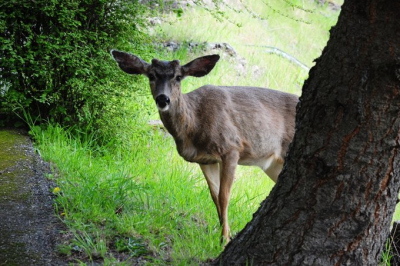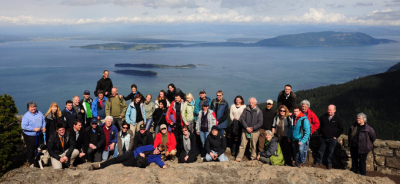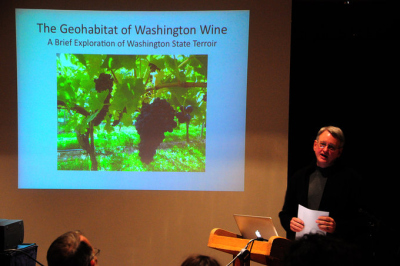Page path:
- Home
- ...
- INTERCOAST
- Latest News
- Archiv
- News 2012
- PhD Student Ruggero Capperucci Attends GeoHab 2012 in Orcas Island, USA
INTERCOAST
PhD Student Ruggero Capperucci Attends GeoHab 2012 in Orcas Island, USA

A local of the Orca Island venue for GeoHab 2012.

Ruggero Capperucci and the other GeoHab 2012 attendees enjoying the spectacular scenery.

Bridging the gap between habitats and wine.
GeoHab is an international community of geo- and bio-scientists founded in 2001 with the goals of improving the exchange of experiences and increasing the connectivity between experts dealing with habitat mapping. Since 2001, the conference has been held every year in a different continent (often in a different hemisphere!).
Now imagine a nice resort on a small and wild island – quite isolated from the closest built-up area…. There are a bunch of scientists (80ish) from 19 different countries…Most of them make up the ‘masters’ of the habitat mapping world and who comprise a small community of people that enjoy sharing their projects, results, and issues. Imagine waking up to face the sea and finding a deer just out of your door!
Welcome to GeoHab 2012!
Hosted in Orcas Island (USA, a few km from Canada), the meeting gathered geologists, biologists, geographers, physicists, and engineers to talk about the cutting edge science for habitat characterization and mapping in coastal and inland seas. More than 45 lectures and 15 posters were presented during the 3 day conference by students, researchers, professors, and representatives from government and industry. Within the session dedicated to technology and methodology, I also presented my research under the title: “High resolution seabed classification of human impacted areas: does it work?”.
A workshop took place the first day, exploiting the contribution of geosciences in monitoring the environment for ocean renewable energy development.
Now imagine a nice resort on a small and wild island – quite isolated from the closest built-up area…. There are a bunch of scientists (80ish) from 19 different countries…Most of them make up the ‘masters’ of the habitat mapping world and who comprise a small community of people that enjoy sharing their projects, results, and issues. Imagine waking up to face the sea and finding a deer just out of your door!
Welcome to GeoHab 2012!
Hosted in Orcas Island (USA, a few km from Canada), the meeting gathered geologists, biologists, geographers, physicists, and engineers to talk about the cutting edge science for habitat characterization and mapping in coastal and inland seas. More than 45 lectures and 15 posters were presented during the 3 day conference by students, researchers, professors, and representatives from government and industry. Within the session dedicated to technology and methodology, I also presented my research under the title: “High resolution seabed classification of human impacted areas: does it work?”.
A workshop took place the first day, exploiting the contribution of geosciences in monitoring the environment for ocean renewable energy development.
A special talk was carried out by the astronaut Bill Anders, a member of the legendary Apollo 8, which left Earth and travelled around the Moon and back for the first time in human history, “all by means of computers with less brain than our digital watch”.
The social program is instrumental for this kind of meeting because it helps promote socialization, exchange of knowledge and interests, bridge new collaborations and enhance research with new inputs and ideas. To get the conversation flowing, a glass of good wine usually helps – that’s the experience. Therefore, one of the evenings was dedicated to the exploration of Washington Terroir, with an introduction (and a tasting session) to the relationship between habitat, grapes, and wine.
To conclude the conference, a field trip around the Orcas Island, explored the complex geological history of the island over the last 500 million years over 7 stops and ending at Mt. Constitution with its awesome view over the archipelago.
See you in Rome for GeoHab 2013!
The social program is instrumental for this kind of meeting because it helps promote socialization, exchange of knowledge and interests, bridge new collaborations and enhance research with new inputs and ideas. To get the conversation flowing, a glass of good wine usually helps – that’s the experience. Therefore, one of the evenings was dedicated to the exploration of Washington Terroir, with an introduction (and a tasting session) to the relationship between habitat, grapes, and wine.
To conclude the conference, a field trip around the Orcas Island, explored the complex geological history of the island over the last 500 million years over 7 stops and ending at Mt. Constitution with its awesome view over the archipelago.
See you in Rome for GeoHab 2013!


